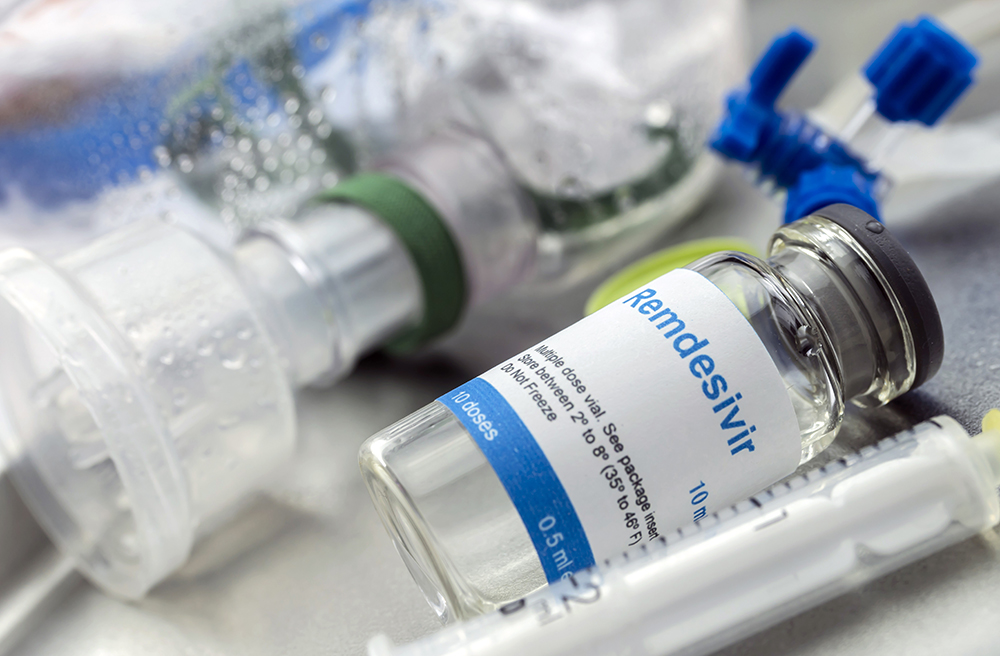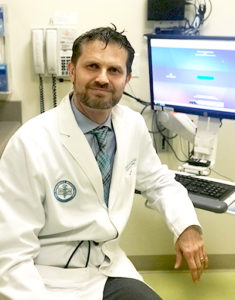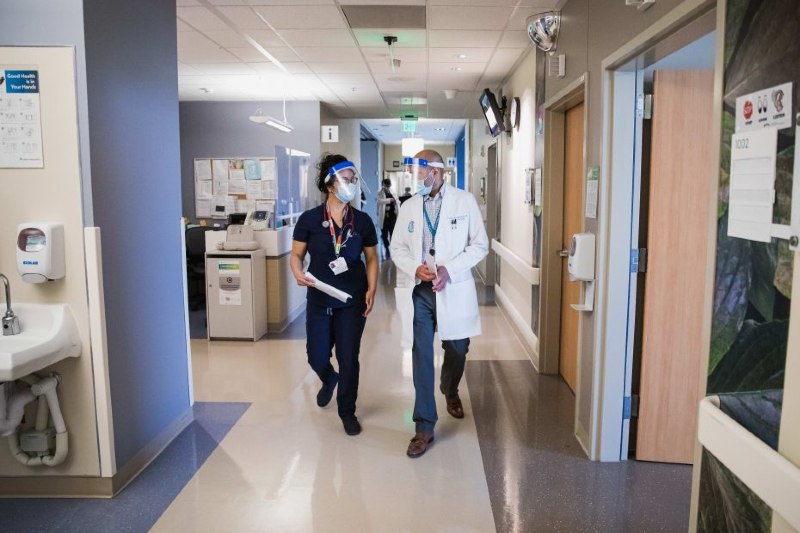PermanenteDocs Chat podcast on flu, COVID, and RSV vaccine safety and effectiveness updates with Sandra Fryhofer, MD, of the American Medical Association.

Clinical trials for treating COVID-19 patients with the antiviral drug remdesivir started at Kaiser Permanente in mid-March and will continue through the end of May.
Permanente Medicine powers coordinated effort around remdesivir clinical research trials
By Michael J. Green
The Permanente Federation
In mid-March, the Southern California Permanente Medical Group’s (SCPMG) clinical trials team realized that COVID-19 was rapidly approaching. With no treatments available, the team investigated options to offer patients. Remdesivir, an antiviral drug, was chosen on the basis of its scientific potential and the sponsor’s willingness to open study sites at all Kaiser Permanente medical centers in Southern California.
The team then moved quickly. Under normal circumstances, the clinical trials group would have months to prepare for this type of study, but they were able to get it up and running in just 8 days. In only 2 months, nearly 550 Kaiser Permanente patients in Southern California were enrolled in the trial, with patients at every Kaiser Permanente medical center in the region.
Clinical trials are carefully controlled research studies to test possible new treatments. To successfully set up a study of this magnitude — in the midst of a pandemic — the team overcame many obstacles. They had to find ways to work with infectious disease physicians at 15 medical centers to screen and enroll patients. Additionally, they needed to develop a new, paperless process for informed consent to comply with infection control standards. They also had to capture and enter a massive amount of data about each patient in the trial.

To accomplish this, more than 160 people from the Kaiser Permanente Department of Research and Evaluation in Southern California, as well as other departments — Research IT, biostatisticians, programmers, research support staff, and pharmacists — innovated rapidly. Soon, investigators had a web-based app and a regional command center to help refer and enroll patients. Data collection and entry was taken care of by support staff from other divisions.
“I have been continually amazed by the dedication and passion of our research staff toward finding a treatment that helps patients afflicted by COVID. They are all heroes, along with our doctors, nurses, and pharmacists,” says William Towner, MD, principal investigator for the remdesivir clinical trials at SCPMG. Dr. Towner and colleagues intend to publish their research results in a peer-reviewed journal.
Other Kaiser Permanente regions soon followed with clinical trials of their own, either via the drug manufacturer, collaborations with academic partners, or contract hospitals. Within weeks, trials were available to members in all Kaiser Permanente regions (see highlights below).
The Permanente Medical Group (TPMG) in Northern California began participating in the same remdesivir clinical trial shortly after Southern California. They presently have 6 hospitals involved in the study with about 50 patients enrolled. Similar to the SCPMG clinical trials team, TPMG was able to get the study started in a short window of time — about 2 weeks — using the integrated approach to care that is at the heart of practicing Permanente Medicine.
“We have not had an inpatient infectious disease trial of any kind in Kaiser Permanente Northern California,” says Jacek Skarbinski, MD, infectious disease doctor and principal investigator for the remdesivir trials at TPMG. “The fact that we did this in less than a month across multiple sites — with quality and fidelity — really speaks to the strength of our integrated and coordinated system.”
Ramping up remdesivir use
Remdesivir is the first drug that has shown encouraging preliminary results in helping patients recover faster from COVID-19 symptoms. The clinical trials that Kaiser Permanente is participating in examine the effects of remdesivir for 5- and 10-day durations in 2 separate studies of patients with severe or moderate COVID-19 infections. The trial is scheduled to close for Kaiser Permanente by the end of this month, when remdesivir is expected to be made more readily available through commercial distribution channels.
I have been continually amazed by the dedication and passion of our research staff toward finding a treatment that helps patients afflicted by COVID.
— William Towner, MD, SCPMG principal investigator
The U.S. Food and Drug Administration recently cleared remdesivir for emergency use for COVID-19 patients in severe condition, which includes individuals who need supplemental oxygen or ventilators to breathe. Since then, the drug has been in high demand across the country. About 1.5 million doses were made available by the manufacturer, which can provide 5 to 10 days of treatment for about 140,000 patients.
“The information we gather through this study will help us understand how best to use this drug to improve care for patients with COVID-19,” says Dr. Skarbinski.
The federal government is currently distributing remdesivir directly to state governments. In turn, the states are supplying the drug to their counties based on data they receive about infected patients in intensive care units.
While details for expanding remdesivir availability are still being worked out, Dr. Towner says the goal is for Kaiser Permanente to offer the drug as part of its standard care for COVID-19 patient treatment.
“Within the very near future, we’ll have a mechanism to distribute remdesivir outside of a clinical trial as part of routine clinical care,” he says.
A coordinated effort
Collaboration between Kaiser Permanente’s care delivery system and research programs has been essential for driving the successful implementation of remdesivir trials across regions. Both sides have leveraged Kaiser Permanente’s existing technology and infrastructure for clinical trials to drive better care for patients with the novel coronavirus.

“We’re taking advantage of patients’ electronic health records to collect data,” says Victor Chen, managing director of the Clinical Trials Program with Kaiser Permanente’s Division of Research in Northern California. “Our researchers and physicians can coordinate across medical centers to create a unified methodology for studying patients.”
Chen adds that the same coordinated effort will be integral for new COVID-19 studies that are underway. This includes an expanded access program that uses blood plasma from COVID-19 patients who have recovered from the infection.
“It’s truly impressive how we can coalesce a whole region into a unified approach,” Chen says. “This really speaks to how well we’ve been able to adapt and manage during the pandemic.”
Clinical trials key to pandemic response
The COVID-19 trials taking place throughout Kaiser Permanente are paving a better path for patients — one that moves beyond suppression and toward treatment of the novel coronavirus.
“Now, more than ever, we need well-designed clinical trials to collect information to make rational choices about how to best deal with this pandemic,” Dr. Skarbinski says. “There are no shortcuts to this. We need these studies to identify effective therapies for future use and eliminate therapies that are harmful or ineffective.”
As we learn more about how to treat COVID-19, Permanente Medicine continues to drive a blueprint for rapid mobilization in response to future large-scale medical responses down the road.
“I think the biggest lesson here was how to set up a multisite clinical trial in a pandemic,” says Dr. Towner. “We don’t know if or when there will be another pandemic, but this has certainly provided us a model for how to proceed forward.”
Highlights from other Kaiser Permanente regions
Remdesivir clinical trials and additional COVID-19 research extends beyond California to all the Kaiser Permanente regions. Here are a few highlights:
- The Colorado Permanente Medical Group (CPMG) is conducting trials through contract hospitals in the greater Denver metropolitan area, including St. Joseph Hospital and Good Samaritan Medical Center. They currently have 26 patients enrolled and 100 screened into the severe conditions study. Additionally, CPMG anesthesiologist John H. Eisenach, MD, conceived of the Colorado COVID-19 Convalescent Plasma Project Consortium to facilitate convalescent plasma collection and use for COVID-19 research in the region.
- The Hawaii Permanente Medical Group opened its hospital site to the remdesivir study, although no patients are currently enrolled due to low rates of COVID-19 in the region. Also, the Kaiser Permanente Moanalua Medical Center and affiliated Maui Memorial Medical Center are participating in a convalescent COVID-19 plasma study run by Mayo Clinic in partnership with local blood banks.
- Teaming up with Holy Cross Hospital in Maryland, the Mid-Atlantic Permanente Medical Group (MAPMG) is also participating in the remdesivir clinical trial. MAPMG has enrolled 42 patients into the severe infections study, and 60 patients were screened for the moderate infections study.
- Northwest Permanente set up clinical trial sites at both of their medical centers in Oregon in close coordination with the Kaiser Permanente Center for Health Research, which has enrolled 22 patients since late March. Kaiser Permanente’s Oregon medical centers are offering the remdesivir trial to all their eligible COVID-19 patients. The collaboration allowed the teams to work in record speed, enrolling the first patients within a week.
- The Southeast Permanente Medical Group referred members who tested positive for COVID-19 to the remdesivir clinical trial through Emory Healthcare in Georgia. Patients are currently being enrolled in a second stage of the initial trial.
- Kaiser Permanente Washington Health Research Institute (KPWHRI) began conducting the first clinical trial of an investigational COVID-19 vaccine for the novel coronavirus in mid-March. KPWHRI is also recruiting members who have been clinically tested for the COVID-19 virus to use their residual specimens for a study funded by the Centers for Disease Control and Prevention for this and other viruses.

